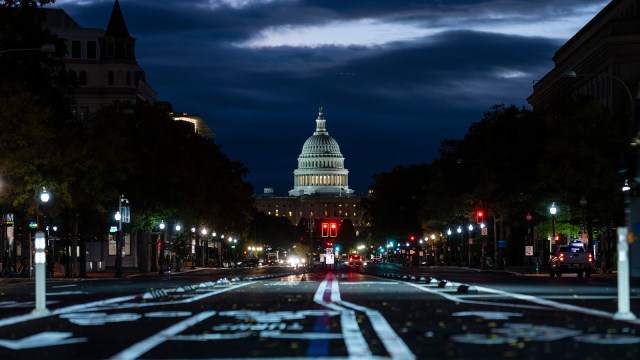What if Democrats’ big shutdown loss turns out to be a win?
After waging a 40-day fight to protect Americans’ access to health care — one they framed as existential — their side folded after eight defectors struck a deal that would allow President Donald Trump and Republicans to reopen the government this week.
 The US Capitol in Washington. Despite considerable hand-wringing in the party about caving to Republicans in the shutdown fight, some Democrats see potential upsides in the outcome. (The New York Times)
The US Capitol in Washington. Despite considerable hand-wringing in the party about caving to Republicans in the shutdown fight, some Democrats see potential upsides in the outcome. (The New York Times) At first blush, the deal that paved the way to end the government shutdown this week looked exactly like the kind of feeble outcome many Democrats have come to expect from their leaders in Washington.
After waging a 40-day fight to protect Americans’ access to health care — one they framed as existential — their side folded after eight defectors struck a deal that would allow President Donald Trump and Republicans to reopen the government this week without doing anything about health coverage or costs, enraging all corners of the party.
But even some of the Democrats most outraged by the outcome are not so certain that their party’s aborted fight was all for naught.
They assert that in hammering away at the extension of health care subsidies that are slated to expire at the end of next month, they managed to thrust Trump and Republicans onto the defensive, elevating a political issue that has long been a major weakness for them.
And in holding out for weeks while Republicans refused to extend the health tax credits and Trump went to court to deny low-income Americans SNAP food benefits, Democrats also honed their main message going into 2026: that Republicans who control all of government have done nothing to address voters’ concerns that the cost of living is too high.
“The end to this government shutdown does not solve their affordability problem,” said Amy Walter, the publisher and editor of the nonpartisan Cook Political Report. “A deal that included an extension of the subsidies would actually have helped.”
That vulnerability is clear in the actions of Republicans from states such as New Jersey and Virginia, which elected Democratic governors by large margins in last week’s off-year elections.
Reps. Jen Kiggans of Virginia and Jeff Van Drew of New Jersey, two Republicans facing competitive races next year, recently sent a letter to Speaker Mike Johnson telling him that once the government was reopened, Republicans needed to “immediately turn our focus to the growing crisis of health care affordability and the looming expiration of the enhanced Affordable Care Act (ACA) premium tax credits.”
It may turn out that the long-term outcome of the longest government shutdown in history will be a grand-scale political and policy defeat for Democrats. The head-scratching end to a fight they were not willing to see through to victory deflated the party and deepened long-simmering divisions before next year’s critical midterm elections. But in the shorter term, there could be benefits.
Senate Democrats believe that they held together long enough for Trump to reveal a new level of callousness in his refusal to fund food stamps for 42 million Americans who rely on the nation’s largest anti-hunger program. And they believe all of that helped contribute to a mini-blue wave last week, one that could continue if Democrats can keep the right issues at the forefront.
“We are not always a party that has great message discipline and we kept the conversation focused on the most important topic, which is Republican destruction of people’s health care,” Sen. Chris Murphy, D-Conn., said in an interview Tuesday. “If that discipline remains, it helps people understand the chasm right now between Trump and Democrats.”
Murphy had been one of the most vocal Senate Democrats beseeching his colleagues to keep standing up to Trump and hold the line in the shutdown fight. On Sunday night, when eight members of the Democratic Caucus broke their party’s blockade on the spending package, effectively assuring what many in the party regarded as a spectacular cave in the standoff, Murphy called it a “major mistake.” He said Senate Democrats should have held firm in opposition.
On Tuesday, Murphy said he still feared that any goodwill from voters who had been impressed watching Democrats actually fighting back might dissipate quickly now that they have folded. But Murphy said he was still optimistic that there had been some gains from the pain.
“There is still a net good that comes from this,” he said, noting that the December vote that Senate Republicans agreed to hold on extending the Obamacare tax credits will give Democrats another opportunity to spotlight their health care message.
“The silver lining of that agreement is that the issue doesn’t disappear,” he said.
Democrats took a gamble when they decided to use the government funding deadline as leverage to demand an extension of expiring Affordable Care Act tax credits that would stave off premium increases and the loss of coverage for millions of Americans.
Forcing the party in power to agree to policy demands in exchange for funding the government is a strategy that typically does not result in a win. Veterans of shutdowns past know this, and never expected Trump to cave to Democrats’ demands.
“The hostage taker never gets the policy demand they claim the shutdown is about,” said Patrick McHenry, a former Republican member of Congress from North Carolina, who helped steer the House through multiple shutdown battles. “Do we even remember what the two shutdowns were about in 2018 and 2019?”
(The answer for most people is barely, and only with the help of Google. In 2018, Democrats buckled quickly without winning legislation they were demanding to grant some immigrants brought to the United States as children work status and deportation protections. In 2019, Trump ultimately caved in what was previously the longest government shutdown fight without getting the $5.7 billion in money for a border wall he had insisted upon.)
“The shutdown party never defeats a unified majority party,” McHenry said, “and the Republican Party is highly unified under Trump.”
Trump may have a unique ability to keep his party together, but he also unites Democrats who might otherwise descend into a full-scale civil war.
“What motivates the Democratic base more than anything is Donald Trump,” Walter said. And that is likely to be more of a factor in next year’s midterm elections than any long-term disappointment in the capitulation of Senate Democrats.
“He is going to do and say so many things that are going to make the Democratic base angry and frustrated,” Walter added.
For now, Senate Democrats are looking toward a health care vote next month that they believe will either result in the extension of the subsidies they have sought, or — far more likely — with large numbers of Republicans casting a politically unpopular vote against helping Americans afford insurance.
And they are turning their attention to winning as many concessions as possible on spending legislation, including undoing some of the deep cuts Trump has made and putting in place guardrails that limit his power.
But Democrats like Murphy say there is a big difference between silver linings and actual triumphs.
“If we end up passing a full-year budget or a series of continuing resolutions that involve no protections for democracy or health care,” Murphy said, “that’s a really bad outcome for the country.”





